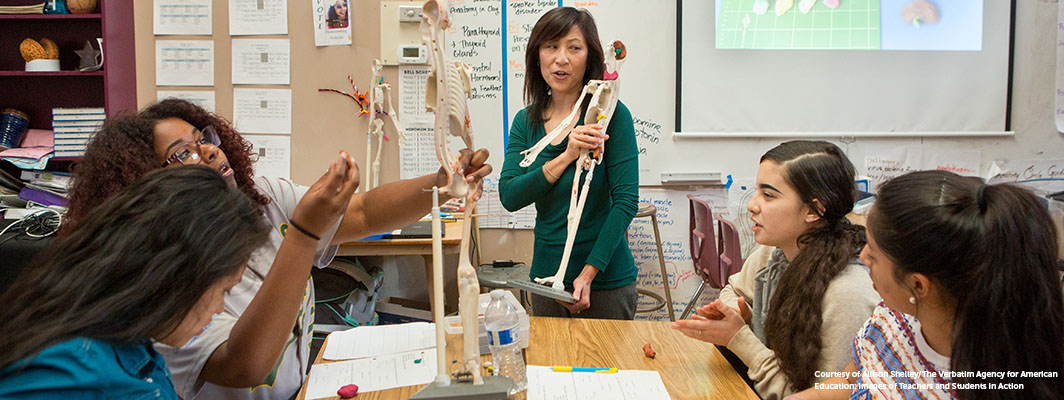
Micro-credentials recognize educators who are meeting the complex, real-time demands of today’s classrooms. Last year, thousands of educators across the country engaged with micro-credentials as a way of personalizing their professional learning and gaining recognition for their skills. The artifacts educators are collecting to demonstrate their skills and the narratives that are coming out of the classroom prove how micro-credentials support educators in ways that impact their students’ learning and their school communities.
Because micro-credentials focus on a single competency, they support educators in honing a specific practice. Instead of tackling the entirety of challenges in a classroom or school at once, educators use the process of earning a micro-credential to examine a challenge in the classroom, engage with rigorous research and rich resources to build knowledge of a skill and plan for implementation, and then document their demonstration of a skill.
Many educators choose to go through this process with other educators in their professional learning communities (PLCs) and departments, and see a multiplying effect in the impact across classrooms. “[Our PLC] met each week, planned together, reflected on possible improvements, planned interventions, planned tutorial time, adjusted lessons and assessments, and discussed results,” said Ryan Johnson, who became a teacher leader in Juab School District in Utah through the district’s competency-based micro-credential pathway.
Alicia Gutiérrez, a teacher at PrepaTec in Mexico, shared that teachers from a wide range of subject areas were interested as she and a department colleague worked on global competence micro-credentials from World Savvy. Of the shift in school culture, she said, “In the past, we did not reflect on the semester’s academic activities, but now it is a natural and necessary practice to make changes and improve ideas.”
As educators work individually and collaboratively on micro-credentials, they are making necessary changes to their practice. Clark County Education Association in Nevada launched three micro-credential stacks on leadership, stakeholder engagement, and the use of school-based data. Teams of educators at schools across the county are examining their practices through these micro-credentials.
“Through micro-credentials, I have reflected upon how I am currently utilizing various resources and groups within my school and community,” said Tiffany Valencia, a teacher at Peterson Academic Center in Las Vegas, after earning the Identifying Stakeholders micro-credential. “I have focused on increasing engagement and the impact of how these groups affect each other. In order to understand these dynamics, I have examined the types of interactions I have had with parents in order to make active changes to bring about different, more meaningful interactions.”
After earning the Understanding School-Based Data micro-credential, Sara Ackeret, a teacher at Stuckey Elementary School in Las Vegas, explained: “The process of completing my micro-credential helped me take a deeper look into the attendance in my classroom—specifically chronic absenteeism. As a team, we looked at how we were encouraging attendance and if our current reward system was addressing the need. After reflection, it was clear we weren’t targeting the actual problem of students who were chronically absent and made changes to address this specific group rather than the whole school.”
Focusing on specific changes within a classroom or school setting is having an impact on how educators engage their students and the effect they have on student learning. For instance, Jim Pedrech, an HP Teaching Fellow in Ontario, Canada, used the Neuro-truths in the Classroom micro-credential to support his students in using evidence-based practices to develop new habits around studying.
Aaron Tomyn, a STEM integration specialist in Sumner-Bonney Lake School District in Washington, reflected on how earning the Analyzing and Communicating with Data micro-credential pushed him to move forward and integrate the skills into his classroom and support students in demonstrating new skills as well:
Aaron’s emphasis on reflection is one that continues to come up as educators share their stories of earning micro-credentials. Educators spend hours planning and executing lessons, and often find it hard to find time to reflect on their practice and make necessary shifts. Reflection is a built-in component of the micro-credential experience, as research clearly outlines the critical role reflection plays in improving teaching practices.
The self-paced characteristic of micro-credentials lends itself well to reflection and provides a professional learning experience that puts educators in the driver’s seat of their learning. As Carrie Budman, a fifth grade teacher from Camp Hill, Pennsylvania, reflects, “Through the endless support of my administrators, earning a micro-credential was a meaningful experience because I was able to set a realistic goal, have time to achieve the goal, and enjoy my time to efficiently reflect. I’m energized to earn my next micro-credential”—just like a growing number of educators, coaches, and school administrators.
Browse our growing catalog of micro-credentials and experience the impact on your practice today!